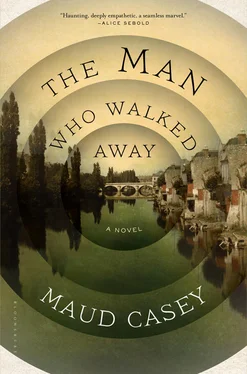When they reach the creek, they take off their boots—“Socks,” Henri says to Walter — and stand in the cool water under the shadow of the trees.
“This is quite pleasant,” says Walter. “Masterful, really.”
“Yes,” says Marian. “Don’t you think so, Albert?”
“Very,” Albert says.
“Very of our hour,” says Walter.
It is as if Albert’s whole lost life has led him here. I am here, I am here, I am here . He closes his eyes to make the moment — the sound of the creek, the birds, the breeze in the trees, the heavy quiet that is Walter, Marian, and Henri nearby — stay, but it is in motion even if he is not. Still, he keeps it in his mind when they walk back up the hill to where the Director demonstrates a series of exercises: windmilling his arms, marching in place, jumping up and down. “Like this!” Elizabeth watches with her vigilant green eyes on the lookout for a miracle, while nearby Rachel smooths and smooths her stomach. When Samuel sees Henri coming, he runs to embrace him.
“Oh, stop it,” Henri says, though he receives Samuel with open arms.
This is a life , Albert thinks. Here . This is his life.
How could he know that what is about to happen would make him willing to give even this up? How could he know that what is about to happen would make him willing to give up all the things he hadn’t known he’d been yearning for — Nurse Anne’s hands pouring silky water over his beautiful feet, the ribbed backs of her seashells rubbed soft, the pleasure of dreams in which he walks with the earth rumbling through his heels but from which he always returns to wake in his bed, not lost at all. His bed .
How could Albert know that what is about to happen will make him forget both his fear that the Doctor would never be back and the flood of relief he feels now that the Doctor is back, not right back but back all the same, putting an arm over his shoulder and leading him to his room? “I would like to try something new,” he says, clearly having forgiven Albert for his lies. “You will have to trust me. Will you trust me?” When they reach his room, the Doctor says, “Sit here in this chair.” How could Albert know that when the lamp flickers, he will flicker too?
The noise from the courtyard peppers the quiet as he sits. The Director’s voice booming, “I dare anyone to find me a lovelier day!” Nurse Anne speaking gently, persuasively to Marian, “Your stomach will return. Name me one time that it has not returned,” to which Marian replies, “This time.” Walter pronouncing Elizabeth “a fine specimen of a woman.” Inside, click, click go the cracked billiard balls as the veteran tosses them across the worn felt of the table, reciting his promises, “I will not knock the balls over the side of the table if I like.” Followed by a crash. “Fuck, fuck, fuck, it is better not to think. Better not to think at all. The thanks I get, when all I am doing is keeping peace.” Rachel’s frog has demanded she play anything else, but she insists on playing one of Chopin’s mazurkas; defiant, it rains down on all of them.
And then the Doctor begins.
You are sleeping. You are nothing .
The Doctor’s voice is a different kind of music; different than the music Albert heard when he first arrived — the blur of my stockings have fallen down; bang, bang; Nurse Anne, Nurse Anne, come quick ; St. Eloi’s giant clock; ring ( shadow ring ) — before he became a citizen held by days and then by over a week. The music of the Doctor’s voice fills his body with a new sound. What sound? It doesn’t matter. It sings in harmony with the people milling around the square outside the Palace of Justice. “Oh, no, not you again ,” a man says, laughter in his voice like the snort of a horse, or was that a horse? The scuffle of children’s feet. “Slow down,” says a woman. “I’m not sure that’s fair,” says a man. “Fair?” asks a different woman than the first.
You are sleeping. You are nothing.
But he does not sleep. He is not nothing. Everything except the brightness of the Doctor’s voice falls away. His warm whisper is a spark in Albert’s dark forgotten heart, the lit fuse of a gas lamp, illuminating blood and muscle.
When his eyes flutter open, he feels as though he will disappear into the Doctor’s eyes.
Perhaps because the Doctor says, “You are disappearing.”
And then the room disappears too.
Shh, Albert.
The Doctor’s voice is a tabletop, its surface expanding. Albert could lay his whole body there.
Shh, Albert. The Doctor’s hand strokes the top of Albert’s head; it smells of pomade and sausage. Your eyelids are warm . He flutters them, and it’s true. They are getting warmer. Everything is warm: the Doctor’s breath on Albert’s face; his swirling fingertips; this body he’s carried with him over the years, or years and years and, oh, he has been so tired. His body grows warmer; it burns off all those lost years. Where did they go? It doesn’t matter. When his eyes flutter open again, the Doctor’s eyes say: I know everything you have forgotten .
There were times when, not knowing how he got there, Albert would discover himself walking at night. The clang of church bells, a trickle from a nearby stream, the texture of the road underfoot his only guides as he stumbled into woodpiles; on one occasion, he fell over the side of a bridge. The Doctor’s eyes are like the sheep Albert once saw up ahead, tufts of white in the pitch-dark night, the time he discovered himself crawling out of a coal bin: This way, this way .
Your arms and legs are motionless.
Where are his arms?
He swims in a long-ago feeling, not caring where his arms have gone. You are sleeping. Your arms and legs are motionless. You are disappearing . He is a boy playing hide-and-seek with Baptiste and his father. He always had to tug Baptiste’s sleeve because Baptiste was content to stand in the middle of the street, not hidden at all. Even as Albert pulled him into the shadows, even as he pleaded— We must hide! — he understood his friend’s desire. Why hide when all you want is to be found? When he finally managed to drag Baptiste behind a barrel, Baptiste would shuffle his feet, as if to announce, Here we are, over here ! When Albert’s father looked over the side, Albert saw himself in his father’s eyes widened in feigned surprise. How beautiful he was to his father. How delighted his father was to find him.
In the quiet room with the Doctor, Albert is a miracle. He is a beautiful boy.
Shh, Albert. Shh. You are sinking. You will not worry about anything anymore.
He is a beautiful boy found instead of lost. He is fascinating. He is magnificent. This is an escapade like no other, no yet another, yet another, yet another.
Shh, Albert. Shh. You are disappearing.
But he does not disappear. He does not vanish. The swirl of the Doctor’s fingers spirals through Albert’s scalp into his ears. He swallows the swirl — down his throat, into his chest, his stomach, his groin, his beautiful instrument, his legs, his beloved feet. It swirls the hair on his arms and legs on end. There you are, Albert, there you are , it sings, singing its swirly song.
Once, on the road, he stopped and a good woman seeing his distress invited him into her house. When he refused because to be rescued again was unbearable, she walked out to him there where he stood and held a glass of sugar water to his lips. The Doctor’s whisper slakes Albert’s thirst. Here, your lost life. Here, your ragged memory.
You will stay in the asylum.
Читать дальше












